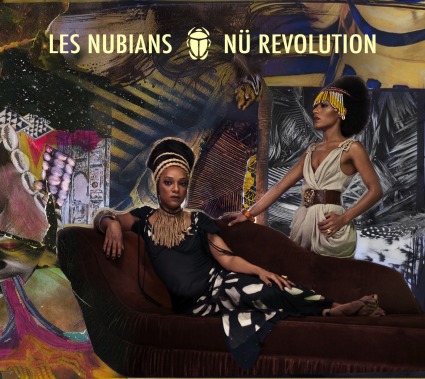Les Nubians | Nu Revolution
Les Nubians | Nu Revolution
By Peggy Oliver
Sometimes in the grand scheme of music, there are history lessons that are taught. Born of a French father and Cameroonian mother, the sisters spent time -between their birthplace of Paris, France, the war-torn Chad, Africa – where their father volunteered for the Red Cross – and Bordeaux, France. When Helene moved away at age nineteen, Celia was battling loneliness but remained passionate about music, especially when it came to jazz. Helene encouraged her sister from afar by sending tapes of Ella (Fitzgerald) and Louis (Armstrong). The sisters reunited after their father’s passing and began their musical quest while educating themselves and others about their upbringing. Their collective – Les Nouveaux Griots – inspired the duo’s name of Les Nubians. Though they discovered more about their Afropean (African & European) roots through time, Les Nubians brought no formal vocal training to the table. Rejected by musicians who were reluctant to work with the duo at first, they persevered by performing cover tunes in acapella and producing poetry slams throughout France. After paying many dues, Virgin Records finally took notice and signed them in the late eighties.
Their debut in 1988, Princesses Nubiennes, was met with mixed reaction, ironically with a more so-so reception from their home country. Yet U.S. audiences were excited to hear their seamless mix of R&B, jazz and hip-hop sung in French and English; graced by African and European accents. Their debut was highlighted by the sweet soul/jazz grooves of “Makeda” (a song honoring African women in history) and a remake of Sade’s “Sweetest Taboo” (“Tabou”). Five years later came One Step Forward – leaning away from the politics and more towards the personal in a quad-lingual package (English, French, Spanish and Cameroonian). Though they firmly established their identity as vocalists, the ladies always championed the spoken word. They demonstrated their support with Les Nubians Presents Echoes – Chapter One: Nubian Voyager on their Nubiatek label; a compilation featuring urban poetic talent backed by a beat-driven soundtrack. After another long wait between projects, Nu Revolution finally arrives; mixing social awareness and personal matters. Once again, Les Nubians stamp their Afropean style with swift flowing harmonies and a steady diet of old and new school R&B, funk, neo-soul, and dance. The theme throughout this Nubiatek/Shenachie Entertainment release signifies a high energy celebration of what we have despite economic pressures and wars surrounding us.
Synopsis of Tracks from Nu Revolution:
Nu Queens Intro – a smooth African drum line (all the drummers are from Cameroon) which constantly shifts rhythms from slow to fast.
Acapella – an answer to the Intro with Les Nubians’ pure joyous harmonies decorated with African traditional vocal techniques.
Africa For The Future – more African rhythms in a contemporary vein complete with claps, horns, woodwinds and the South African Afro-fusion band Freshlyground.
Afrodance – has that Prince pounding new wave/funk written all over it but with an African aftertaste; the ladies sure have Prince’s soul fried attitude to match.
Déjà Vu (Already You) – a duet with soul powerhouse Eric Roberson providing plenty of sensual tension driven by break beats.
Femme Polylandre (Polyandrous Woman) – the first mellow track off Nu Revolution as Les Nubians’ voices emits a Sade vibe and a couple of spoken word moments.
Fraicheur Souhaite (Freshness Desired) – another ballad with the ladies’ neo-soul touch.
Les Gens (People) – a touch of the new jack swing with an unusual harmonic spoken word breakdown and a rap about social consciousness on behalf of immigrants from Blitz the Ambassador: “Just try to walk in my shoes.”
M’Bengue (A Letter from…) – with that suave soul dance flair which made Soul II Soul and others shine during the eighties and nineties; inviting the listener exclusively to a special place: “Come with me to Cameroon;” climaxed by triumphant chants from an African male chorus.
Liberte (Liberty) – another mid tempo laid-back soul dance experience with a subtle African accented groove and gospel inflections.
Veuillez Veiller Sur Vos Reves – J Period Remix (Don’t Let Your Dreams Fall Asleep) – an eighties-flavored tight hip-hop/R&B bounce a la Mary J Blige. A major contributor to Les Nubians career – rapper John Banzai – confidently bounces off the ladies’ vocal hooks.
Nu Revolution – Asking questions like “Are we walking in the same direction? How are we paving the way?,” the Spanish-flavored title track starts with a pop/R&B flavor; then fades into a montage of adult and children’s voices.
Nu Soul Makossa – honoring Soul Makossa recorded by Cameroonian legend Manu Dibango in the seventies; updated for the millennium with a slight rhythmic R&B/hip-hop attitude alongside Dibango in a brief appearance.
Vogue Navire (Sail On) – a hypnotizing, soothing ballad as Les Nubians’ harmonies sail on in a sea of keyboards and underlying African percussion.
The minor problems on Nu Revolution here are few and far between; notably the length of Vogue Navire which could have been easily been trimmed two minutes. Even though Les Nubians’ vocal quality is quite exquisite, they hold back a bit too much on Fraicheur Souhaite. But that aside, there are many reasons on Nu Revolution to enjoy Les Nubians’ appreciation for where they came from and what they strive for every time they sing.
Peggy Oliver
The Urban Music Scene
